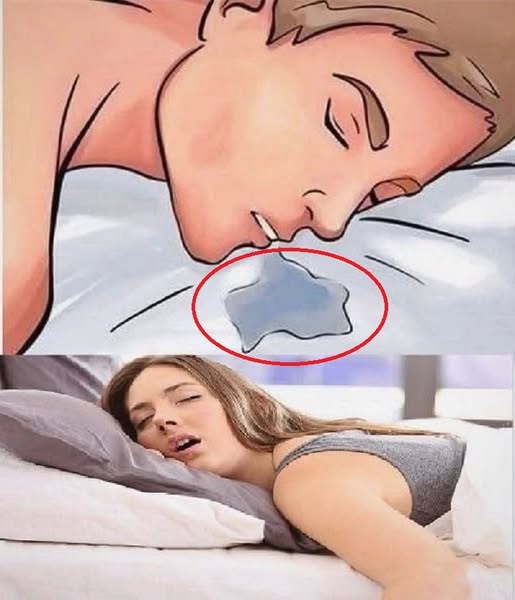Let’s be clear: waking up to a wet pillow isn’t unusual. Drooling during sleep is something most people experience at some point in their lives, and in the majority of cases, it isn’t harmful. Still, it can feel embarrassing—especially if it happens on an airplane, at a friend’s house, or worse, on your in-law’s pristine couch. While often harmless, drooling can sometimes point to underlying health issues worth discussing with a doctor.
Here are ten common reasons you may drool in your sleep, what you can do about it, and when you should consider medical advice.
1. Sleep Position
Your sleeping posture is one of the simplest explanations. During rest, facial and jaw muscles relax. If you’re lying on your stomach or side, gravity naturally encourages saliva to slip from the corners of your mouth. Congestion can make it worse, as blocked nasal passages push you to breathe through your mouth. Many people find they drool more often during colds or allergy flare-ups, and the issue usually fades once breathing clears up.
2. Medication Side Effects
Some medications list drooling as a side effect. Sedatives, antipsychotics, antibiotics, and even common NSAIDs like ibuprofen can all increase saliva flow. This isn’t a reason to stop taking prescriptions without guidance, but if it bothers you, your doctor may adjust the dosage or recommend alternatives.
3. Nasal Congestion
When your nose is stuffed, you instinctively open your mouth while sleeping. Seasonal allergies, sinus infections, or a simple head cold can all trigger mouth breathing, which in turn causes drooling. Because congestion is temporary, the drooling often resolves on its own once the illness or allergy flare passes.
4. Deviated Septum
If you consistently struggle to breathe through your nose, you may have a deviated septum. This condition occurs when the cartilage dividing the nasal cavity is misaligned, restricting airflow. Mouth breathing then becomes your default, making drooling more likely. While surgery is sometimes recommended in severe cases, evaluation by an ear, nose, and throat specialist is the best first step.
5. Sleep Apnea
Sleep apnea is a condition in which breathing repeatedly pauses during sleep. One of the side effects is increased mouth breathing, which leads to drooling. Other warning signs include loud snoring, choking sounds during sleep, and chronic fatigue even after a full night’s rest. Sleep apnea is serious—it affects your health and quality of life, as well as the sleep of those around you. If you suspect it, don’t delay seeking medical help.
6. Oral Infections or Dental Issues
Cavities, gum infections, and other dental problems can trigger saliva production. Pain, swelling, bleeding, or difficulty chewing may accompany this. If drooling comes alongside these symptoms, a trip to the dentist should be a priority. Prompt treatment can prevent complications and stop the problem at its source.
7. Gastroesophageal Reflux Disease (GERD)
GERD, commonly known as acid reflux, doesn’t just cause heartburn—it can also lead to swallowing difficulties and excessive saliva. As a result, people with GERD sometimes notice more drooling at night. If you have frequent reflux along with drooling, consult your doctor for options ranging from dietary adjustments to medication.
8. Neurological Conditions
Certain neurological disorders can interfere with the body’s ability to manage saliva, leading to drooling. Conditions such as Parkinson’s disease, Alzheimer’s, ALS, stroke, and cerebral palsy are all linked to sialorrhea (excessive saliva). Interestingly, even a vitamin B12 deficiency can contribute to neurological changes and drooling. Because these causes are more serious, medical evaluation is crucial if drooling is sudden, severe, or paired with other neurological symptoms.
9. Teeth Grinding
Nighttime teeth grinding, or bruxism, often requires a mouthguard or mandibular device for protection. While these devices are essential for preventing tooth damage, they can sometimes make drooling worse by keeping the mouth slightly open. If this becomes uncomfortable, a dentist may recommend adjustments to the device.
10. Pregnancy
Pregnancy brings countless changes, and excess salivation—called ptyalism gravidarum—is one of them. Hormonal shifts, stress, and even swollen salivary glands can contribute. Though usually temporary, it may persist through certain stages of pregnancy and often resolves after delivery.
Six Ways to Reduce Drooling During Sleep
- Adjust Sleep Position – Training yourself to sleep on your back can reduce drooling. It takes practice, but gravity works in your favor.
- Try Home Remedies – Chewing on lemon wedges, sipping water regularly, or staying well-hydrated may thin saliva. Just be cautious with citrus, which can damage tooth enamel.
- Use a Mandibular Device – Oral appliances can help align the jaw and reduce drooling, though results vary.
- Treat Sleep Apnea With CPAP – For those diagnosed with sleep apnea, a CPAP machine not only prevents breathing pauses but may also reduce nighttime drooling.
- Botox Injections – For severe cases, doctors sometimes inject Botox into salivary glands to reduce saliva production. The effect is temporary and requires repeat treatments.
- Surgery (Last Resort) – In rare cases, removal of salivary glands is considered, typically for neurological conditions rather than common drooling.
When to Seek Medical Advice
Most drooling is harmless, but if it suddenly becomes excessive, interferes with sleep, or is paired with difficulty swallowing, speech changes, or persistent pain, a medical consultation is necessary. Doctors can run tests, check for infections or underlying conditions, and create a treatment plan tailored to your needs.
The Takeaway
Drooling while sleeping is normal for many people and often nothing more than an inconvenience. But when it becomes excessive or comes alongside other symptoms, it may signal an underlying issue worth addressing. Paying attention to your body, making small adjustments, and consulting professionals when needed can improve both your sleep and overall health.

